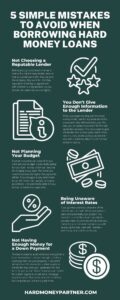If you’re in a fix and flip business or renovating a home, hard money loans are great options for funding these projects. However, because they are different from traditional loans, it can be easy to make mistakes when borrowing money through this lender. Here we explain how you can avoid these hiccups to have an easier time working with a hard money lender.
Not Choosing a Reputable Lender
Before you sign a contract or enter a deal with a hard money lender, ensure that you understand who they are and the company they work for. Are they reputable? Entering an agreement with a lender is a big decision, so you should not make the decision lightly.
You’ll want someone trustworthy and effective in their work and aligned with your interests. Ask around from other clients that worked with the lender to get a better idea of who you might be working with.
Additionally, never be afraid to browse their website and online reviews; this will give you a better idea of what to expect from them and how they conduct business. Also, ask as many questions as you can of the lender. If you want a lender with experience, ask the individual how many years they’ve been in this line of work and what type of properties they’ve funded before. On top of who the lender is, what payment plans do they offer, and are there any penalties for late payments?
You Don’t Give Enough Information to the Lender
Traditional loans that go through a bank require a lot of paperwork and background information. While hard money flip loans are easier to apply for and receive, you still need to provide a decent amount of financial and personal information. The lender will not just order a background check and approve your loan; they will need to know who they are working with and a clear picture of your finances before trusting you with a large sum of money.
When you begin working with the hard money lender, ask for a precise list of the documents they will need from you. This way, you can prepare yourself for the loan application process. You can expect to give the lender one- or two-years’ worth of tax returns and a profit and loss statement if you own a business, like a fix and flip real estate company.
Ignoring requests and necessary documentation will slow the process, and you will not receive the loan promptly. Have everything ready as soon as you decide to apply to avoid any delays down the road. Ensure the hard money lender understands your goal for the property and the reasons why you need a loan.
Not Planning Your Budget
Do you have a budget set for your property? Entering a contract with a lender will not work unless you know exactly how much money you need. Otherwise, you risk a lot of confusion and poor communication.
Another issue that can arise when you don’t set your budget is potentially asking for too much money, which can become challenging to pay back. The more you need to borrow, the higher the payments will be. If you struggle to pay back these loans, the lender can use your property as collateral and potentially seize it if you fall too far behind on payments.
However, until you complete construction, you are typically only responsible for paying the interest on the loan. Once the project is complete, you will need to begin making full loan payments. Configure your budget before entering a deal and leave a little wiggle room in case there are surprises or accidents that need fixing while on the fix and flip job.
Being Unaware of Interest Rates
Did you know that hard money loans have higher interest rates than other loans? The main reason is that these lenders are willing to take on higher risks with fewer requirements than traditional loans. These loans give you fast access to a large amount of money, so rates can vary from 10 percent and up.
If you go into a contract unaware of the interest rates, it could derail your payback plans and potentially your project. You need the cash to flip a home quickly, but you also need to understand that once you complete your renovation project, you will be paying the loan back with interest—which may be problematic for you.
Not Having Enough Money for a Down Payment
The last mistake to avoid when borrowing from a hard money loan is to have enough cash for a down payment on your property. If you don’t already have the money for a down payment, the lender may deny your application for the loan. To give you an idea of what you can expect for a down payment, a traditional mortgage might be up to 20 percent, and a hard money loan requires you to have slightly more.
Again, before signing a contract or making a deal with a lender, ask for the amount for the required down payment in writing so you can calculate how much cash you need on hand to begin the project before acquiring the hard money loan. Because the stakes are higher with this type of loan, the lender will ask you for more in interest and payments.
When you take out a loan, allow for some leeway, and leave money left over for extra construction equipment or materials, so you don’t have to go through the loan process again to borrow more cash. Also, ensure all dollar amounts, both what you are borrowing and what you must pay back are in the contract before you sign it, so everyone is aware of the stipulations and requirements of the loan.
Take your time finding a lender for your project; you don’t need to settle on the first company or person you come across. Get to know their values and what they expect from the partnership before signing a contract. Prepare yourself for higher payments and interest rates, but also prepare for a quick turnaround and to receive the cash for your project quickly after finishing the application. Be smart when working with a lender and understand all terms of agreement before moving forward.





